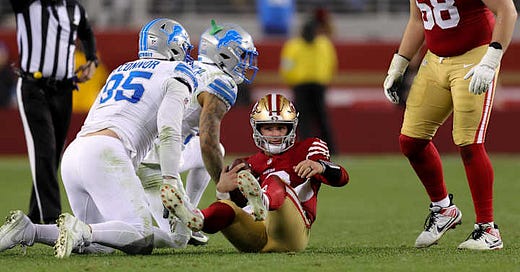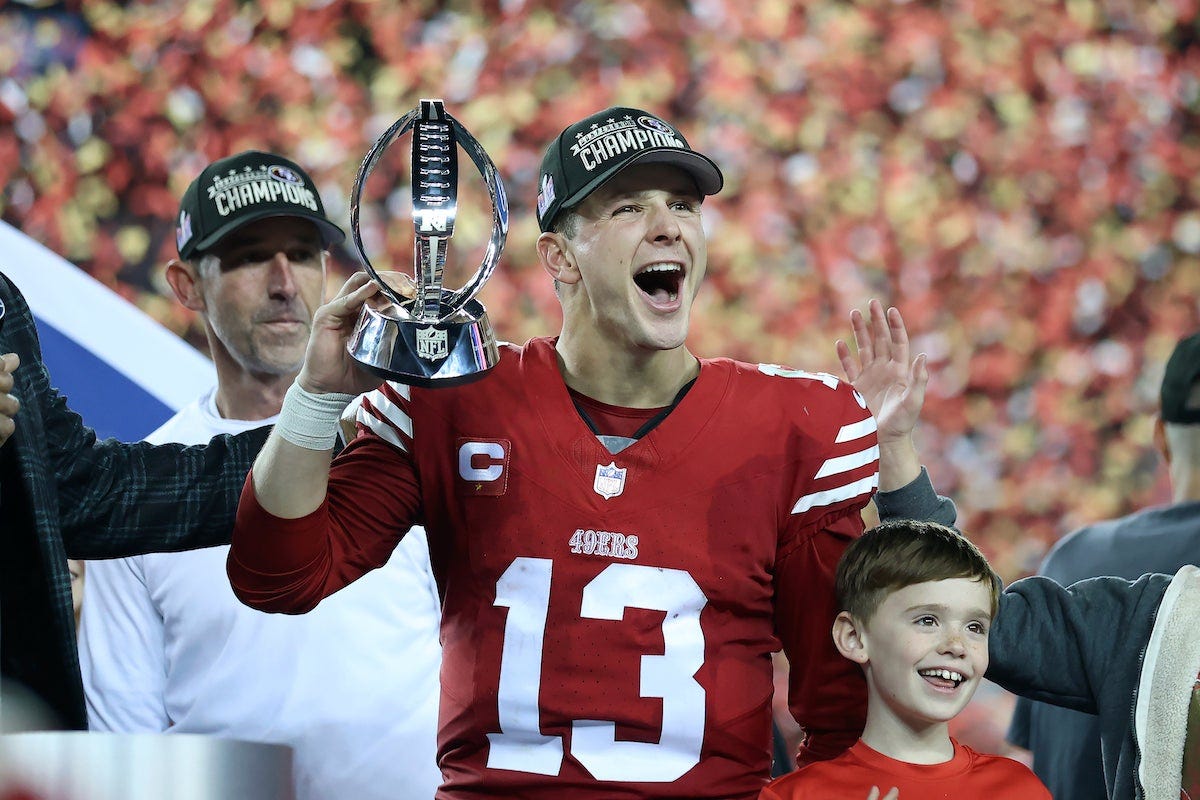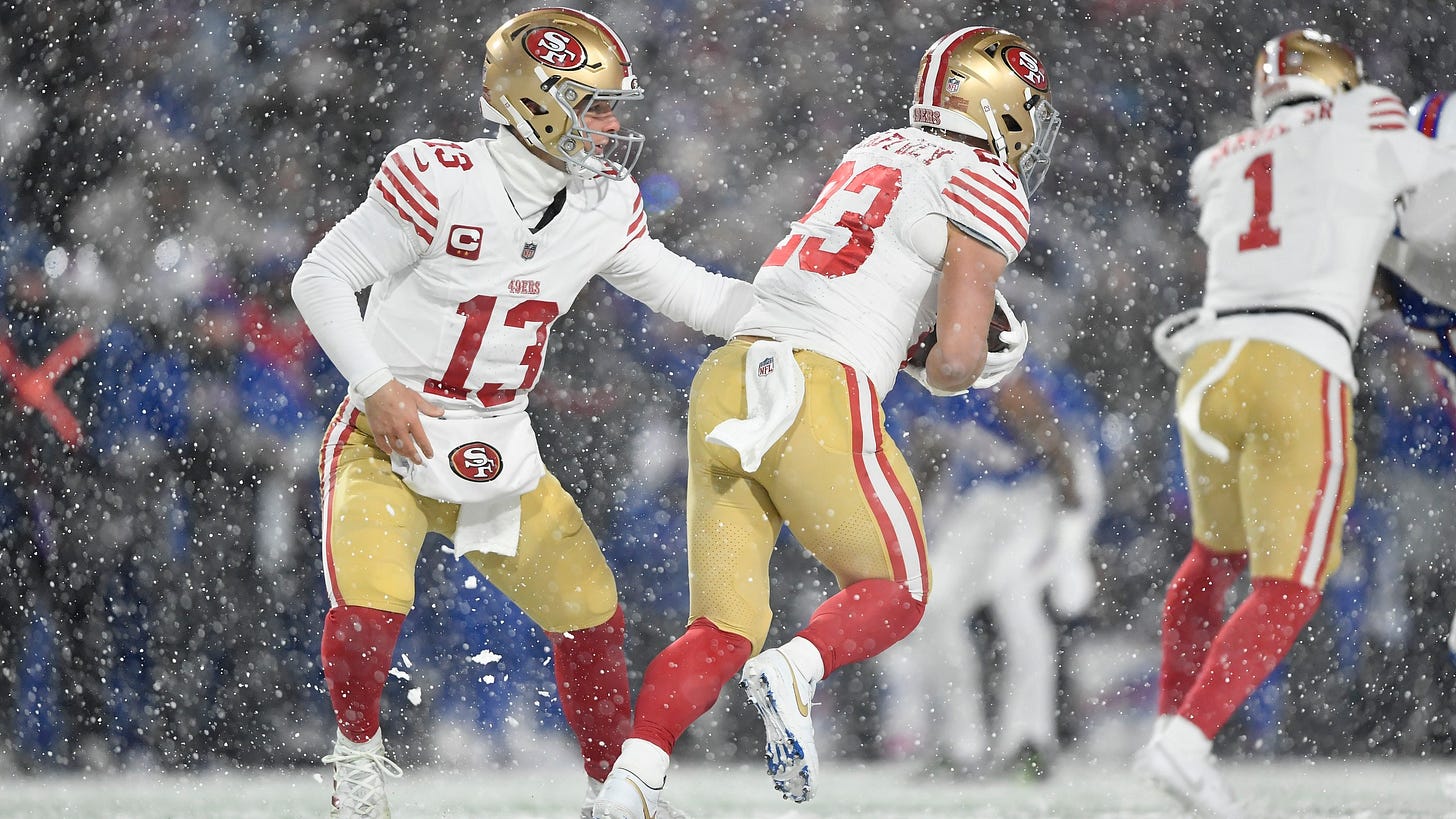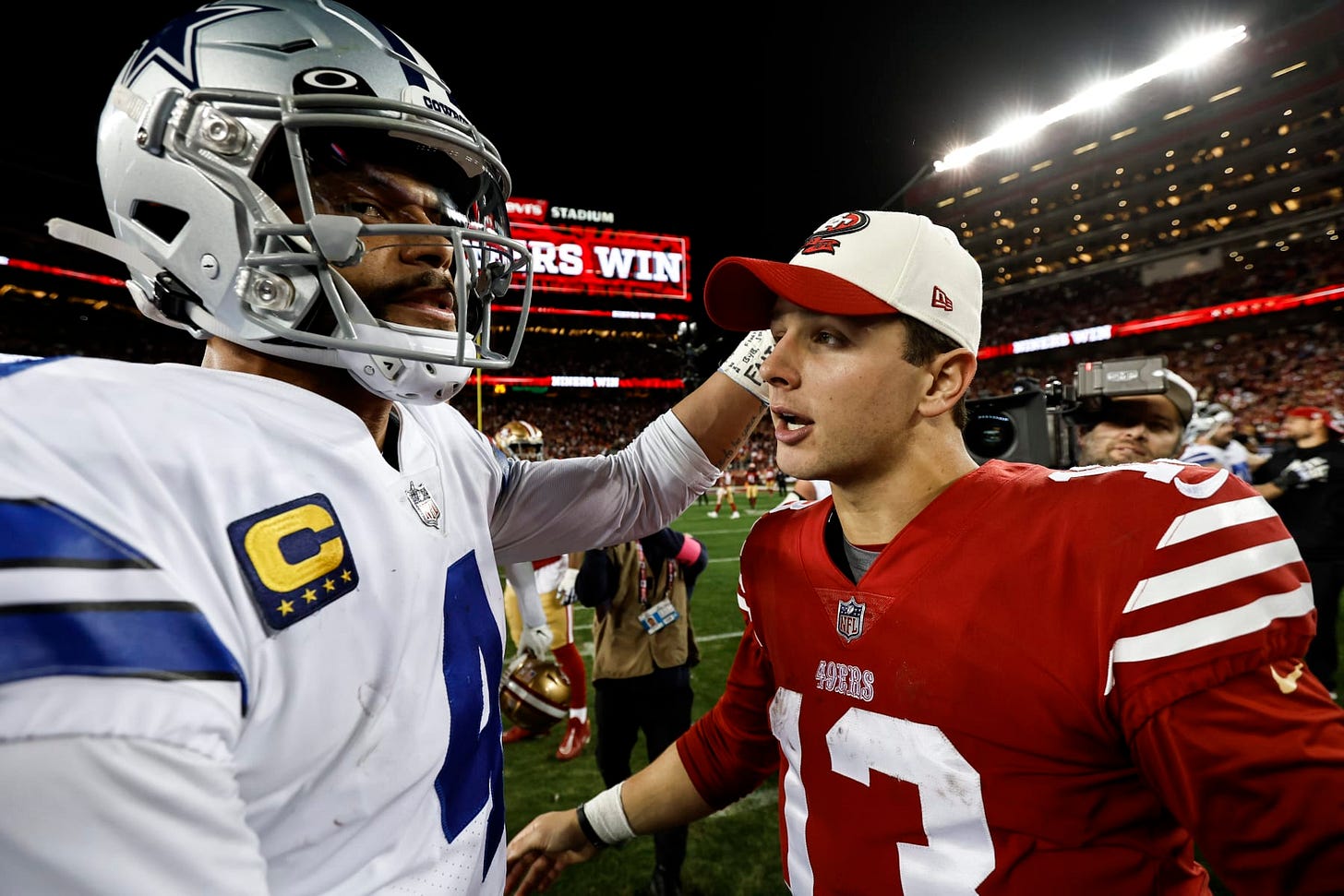The High-Stakes Gamble: Why the 49ers Should Wait on Brock Purdy’s Contract
With Brock Purdy's impending contract signing on the near horizon, should the 49ers actually wait to get this done until next season? Some reasons why.
First, if you haven’t read my articles on the reasons why the 49ers SHOULD pay Brock Purdy, I highly recommend doing so. The intent here is to make a case for or against and let the fans decide what they think should happen. In general, these are fun debates to have.
The San Francisco 49ers stand at a crossroads heading into 2025. Fresh off a Super Bowl appearance in 2023 and a turbulent 2024 season that fell well short of expectations, the franchise faces a quarterback dilemma that could define its trajectory for the next decade. Brock Purdy, the former “Mr. Irrelevant” turned Cinderella story, has polarized analysts and fans alike.
His meteoric rise in 2023—12 wins, a Super Bowl berth, leading the team to two come-from-behind victories in the divisional and NFC Championship games, and a league-best 72.8 QBR—cemented his status as a franchise cornerstone.
But his 2024 regression—20 touchdowns, 12 interceptions, and a 4-4 start—has cast doubt on whether he’s truly elite or merely a product of Kyle Shanahan’s system and an all-star cast.
As the 49ers weigh whether to commit to Purdy with a record-breaking contract or delay negotiations until after 2025, the stakes couldn’t be higher.
The question isn’t whether the 49ers should pay him, but when.
They hold leverage over Purdy: if he holds out for a better offer, they could turn to Mac Jones. Otherwise, they can wait until next offseason to extend or franchise-tag him.
Their decision will reflect not only their faith in Purdy as the franchise’s future but also ownership’s confidence in Kyle Shanahan. This may be Shanahan’s last shot with a quarterback of his choosing. Whether the timeline is one year or four, these choices will reverberate for years.
The Case Against Paying Purdy: A Deeper Dive
Diminishing Returns: Sacrificing Depth for Star Power
The NFL’s salary cap is a zero-sum game. Committing $60 million annually to Purdy—a figure that would place him among the top five highest-paid quarterbacks—would force the 49ers to gut their roster (they’ve already traded Deebo Samuel).
In 2025 alone, the team had 18 free agents, including defensive stalwart Dre Greenlaw, versatile safety Talanoa Hufanga, and starting guard Aaron Banks (with Hufanga, Banks, and Greenlaw all signing elsewhere).
Retaining even half of those players would require cap gymnastics, let alone re-signing stars like George Kittle (due for a new contract in 2026) or pursuing free-agent acquisitions. At the recent owners’ meetings, owner—and trust-fund baby—Jed York admitted the 49ers had to penny-pinch with current free agents. NFL reporter Mike Garafolo quoted York as saying:
“We knew that we had to make sacrifices around the roster to make sure that you can pay a quarterback. It’s just math.”
Consider the 2020 Kansas City Chiefs, who paid Patrick Mahomes $45 million annually. To afford his deal, they parted with key contributors like Tyreek Hill, whose departure coincided with a noticeable dip in offensive explosiveness. Of course, Mahomes—being the great equalizer—led the Chiefs to two more Super Bowls afterward.
Similarly, the 49ers’ 2024 struggles without Christian McCaffrey (who missed five games due to a hamstring injury and a knee issue) revealed how reliant Purdy is on elite weapons. Losing Greenlaw—a defensive pillar—could further destabilize a unit that regressed from No. 1 in points allowed in 2023 to 12th in 2024.
The Kirk Cousins Precedent: A Cautionary Tale
Kirk Cousins’ four-year, $180 million deal with the Minnesota Vikings in 2022 offers a sobering parallel. While Cousins delivered statistically (4,547 yards, 35 touchdowns in 2023), his $45 million cap hit hamstrung the Vikings’ ability to retain defensive stars like Danielle Hunter and Eric Kendricks.
The result? A porous defense (24th in yards allowed) and a 7-10 record in 2023, missing the playoffs entirely. To be fair, Cousins was injured in 2023, but from 2018–2023, the Vikings went 1-2 in the playoffs, reaching the postseason just twice with Cousins under center.
Purdy’s situation mirrors Cousins’ in one critical way: Both thrived in systems loaded with offensive weapons (Stefon Diggs, Justin Jefferson, and Dalvin Cook in Minnesota; McCaffrey, Samuel, Aiyuk, and Kittle in San Francisco).
But when those weapons dwindled—due to injury (49ers) or cap casualties (Vikings)—their limitations were exposed. Paying Purdy top dollar risks replicating Minnesota’s fate: a quarterback eating up cap space while the roster crumbles.
Injury History: A Ticking Time Bomb
Purdy’s injury résumé is alarming for a 25-year-old quarterback. His 2022 UCL tear required offseason surgery; he suffered an apparent concussion in 2023 (though he didn’t miss games); and he left two games late in 2023 with shoulder injuries (back-to-back contests against Arizona and Baltimore).
In 2024, another elbow injury resurfaced in his throwing arm (the team has been notably secretive about its severity), sidelining him for at least one midseason game. A Week 17 blow to the same arm ended his season prematurely. To this day, the extent of his 2024 arm injuries remains unclear.
History is littered with quarterbacks derailed by durability issues. Andrew Luck retired at 29 after years of injuries; Dak Prescott’s 2020 ankle fracture and 2021 shoulder strain slowed his ascent (Prescott also missed half of 2024).
Purdy’s smaller frame (6’1”, 220 lbs) and aggressive play amplify these concerns. Investing $250 million in a quarterback with two significant injuries in three seasons is a gamble the 49ers can’t afford without more data.
2024: A Season of Regression and Revelation
The 49ers entered 2024 with sky-high expectations. Instead, they unraveled. Brandon Aiyuk’s contract holdout bled into the regular season, depriving Purdy of vital training-camp reps with his No. 1 receiver. McCaffrey’s Week 5 hamstring injury (which lingered all season) stripped the offense of its security blanket. By midseason, the cracks were undeniable:
Stagnant Offense?
Without McCaffrey’s dual-threat prowess, San Francisco’s rushing attack plummeted from 5th in yards (2023) to 18th (2024). Purdy’s play-action effectiveness—a staple of Shanahan’s scheme—dropped sharply (his passer rating off play-action fell from 129.3 to 94.1).
The running game remained relatively efficient (12th in rushing EPA/play), though that’s a steep decline from first overall in 2023. The offense as a whole finished 11th in EPA/play (9th in passing EPA/play)—a far cry from the 30-point explosions fans had grown accustomed to. Still, Shanahan managed to avoid a complete collapse.
Defensive Regression
The 49ers’ defense, once a turnover-forcing machine, managed just 18 takeaways (down from 28 in 2023). Missed tackles and blown coverages—particularly in losses to the Rams and Seahawks—highlighted the unit’s reliance on Fred Warner and Nick Bosa to mask deficiencies.
They also failed to secure late-game stops (vs. Minnesota, Los Angeles, Kansas City, and Seattle), finishing 26th in EPA/play—their worst mark under Shanahan since 2018. For the first time, the offense needed to shoulder the load—and couldn’t.
Purdy’s Struggles
A key reason for the offense’s decline was Purdy’s regression. His 12 interceptions included seven on throws into tight coverage (per Next Gen Stats), a sign of forced passes when playmakers couldn’t separate.
His QBR under pressure (38.9, ranked 22nd) paled in comparison to his 2023 mark (67.2, 3rd). His accuracy also plummeted, falling from 12th in on-target throw percentage (2023) to 39th (2024, per Sports Info Solutions).
The Avengers Effect: A Safety Net Removed
One baffling aspect of the 49ers’ 2024 offense was its drop to 11th in EPA/play despite rarely fielding a full complement of All-Pros. Purdy still had Aiyuk, Deebo, Kittle, or Trent Williams in every game—yet couldn’t replicate 2023’s dominance.
This raises a critical question: Can Purdy succeed without an elite supporting cast?
The NFL’s transcendent quarterbacks—Mahomes, Josh Allen, Lamar Jackson—elevate subpar weapons. Mahomes won a Super Bowl with Marquez Valdes-Scantling and Kadarius Toney; Allen carried the Bills to the playoffs with Gabe Davis as his WR2; Lamar won MVP pre-Derrick Henry.
Purdy, by contrast, posted a noticeable dip in production without Aiyuk or a healthy McCaffrey.
The Clutch Factor: A Missing Ingredient
Purdy’s 2023 clutch gene vanished in 2024. The 49ers went 1-6 in games where he had a chance to lead a game-winning drive—a stark contrast to his 2-2 record in such situations the previous year. While Ronnie Bell’s dropped deep ball against the Rams (Week 3) was excusable, other failures were self-inflicted:
1. Week 5 vs. Cardinals: A potential game-winning drive ended with an interception; Purdy admitted to locking onto Kittle too long.
2. Week 7 vs. Chiefs: Trailing 21-12, Purdy threw a red-zone interception to Jaylen Hicks on a forced pass to Chris Conley.
3. Week 15 vs. Rams: A late-fourth-quarter interception killed any comeback hope.
4. Week 17 vs. Lions: Two late-game interceptions in a shootout sealed the loss.
Context matters—Purdy wasn’t solely to blame (e.g., Jordan Mason’s red-zone fumble vs. Arizona; Deebo’s dropped touchdown vs. the Rams). But why does Purdy receive more grace than other quarterbacks? Shouldn’t he have to prove he can elevate the team when the odds are stacked against him? Some might point to the NFC Championship game against Detroit as evidence, but one playoff rally doesn’t offset a season of missed opportunities. Three more wins in those 1-6 games might have secured a playoff berth.
The 2025 Season: A Prove-It Year
Delaying Purdy’s extension until after 2025 offered some advantages:
1. Cap flexibility: The 49ers could use $32 million in projected 2025 space to re-sign Greenlaw, Hufanga, or an offensive lineman.
2. Leverage: If Purdy rebounds, justify a top-tier deal; if he struggles, offer a Cousins-esque “prove-it” contract or franchise-tag him.
3. Roster evaluation: With McCaffrey turning 29 and Trent Williams nearing retirement, the 49ers must assess whether their window is closing or if a youth movement (led by Purdy) can sustain contention.
With no Deebo, a potentially limited McCaffrey, and Aiyuk’s availability in question, 2025 is Purdy will be in a similar situation to last season but has another chance to prove he’s the guy.
Outlook
The 49ers have undoubtedly weighed these factors, and all signs point to a long-term deal regardless. The risk is enormous, but the payoff could be franchise-defining—if Purdy stays healthy and the weapons around him produce. Still, there’s no shame in waiting.
In Part Two, we’ll examine film and data reasons for delaying a massive contract—or structuring a more manageable, tier-two deal.











Fair analysis. Though a small sample size of games, regression to mean is a viable critique of Purdy results in 2024. Is Purdy responsible for the semi-breakout of Jennings? Arguably, yes, or no. A Team friendly contract, I think he is owed a $5 Million final year of his contract, isn't out of the question. Though the signals from the management team has always been an extension of his rookie contract, they could course correct. He saved that same management from embarrassment over the #3 pick washout and he has been a cheap qb1 the last 2 seasons. All that said, QB1 contracts in the league, of even second tier talents, are trending in the $50s APY. I expect an extension at "market rates" which will put a lot of pressure on Purdy, as well as the trust fund dude and his management team. Thanks for the 10th man analysis.